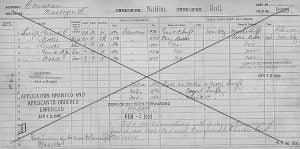This is a guide to searching our Final Rolls, also known as the Dawes Rolls. The Final Rolls database can be searched to discover an enrollee’s name, age, sex, blood degree, type, census card number and roll number.
The following letter guide was furnished by the National Archives. These letters can appear both on Type and Card number.
| A – Adopted AD- Adopted Delaware BB – By Blood D – Doubtful or denied F – Freedman FD – Freedman, doubtful or denied FM – Freedman, minor | FRR – Freedman, rejected IW – Intermarried White MCR – Mississippi Choctaw Rejected NR – Not Registered, Non-Resident O – Owner* OS – Old Series** Old Settler P – Parent |
*Owner – at one time a slave
Old Series – At one time this person had another card, and the information was transferred to a new card. Some Search Hints
Search Suggestions
These suggestions are offered with the hope of making your search more fruitful. The key to a successful search is careful reading, and I will provide a couple of examples to demonstrate what can happen when you read, search, and apply for Packets. Be sure to click on the links provided so you can see how to effectively conduct this search.
On a search for “Frank Smith” the results show 6 matches with 2 individual card #’s. Each enrollment card has a family on it, so we are dealing with two families. The question arises are we dealing with the same or two different families?
For instance, I found Frank T. Swift (Card #D288—where ‘D’ indicates ‘doubtful’). By clicking on his census card number, I was able to see his full family. I had a copy of his census card, which is the image included on this page. Here’s where careful reading becomes essential: if you look at the bottom of the card, you’ll notice a handwritten note that provides additional information.
Feb. 3, 1909, in accordance with the decision of the Commission of Jan. 15, 1903, No’s 1-5 incl. are transferred to Cherokee card #10078
Now, take a look at Frank T. Swift, Card #10078. By clicking on his census card number, you can access a list of Frank and his family members. You’ll also see that they were neither denied nor marked as doubtful. Without the census card, the search becomes a bit more challenging. However, by following the census card numbers, you may discover that some cases initially marked as doubtful, denied, or rejected can change over time. It’s important to have a good idea of your ancestor’s name and tribe before starting your search to make it truly effective.

